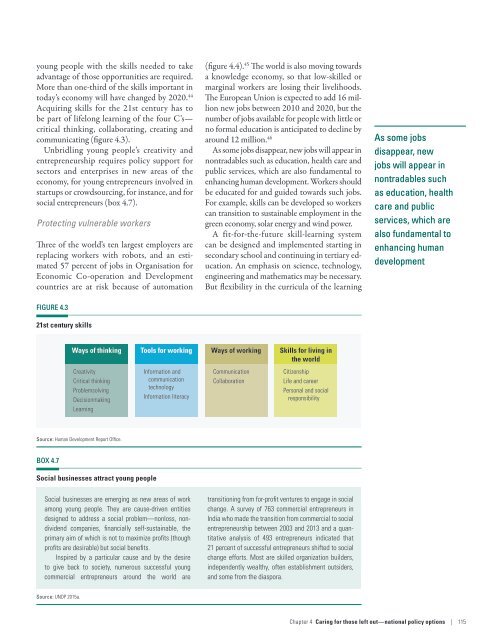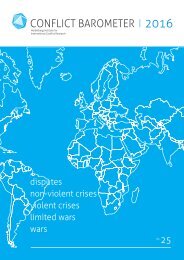Human Development Report 2016
6Tyccfrzw
6Tyccfrzw
Create successful ePaper yourself
Turn your PDF publications into a flip-book with our unique Google optimized e-Paper software.
young people with the skills needed to take<br />
advantage of those opportunities are required.<br />
More than one-third of the skills important in<br />
today’s economy will have changed by 2020. 44<br />
Acquiring skills for the 21st century has to<br />
be part of lifelong learning of the four C’s —<br />
critical thinking, collaborating, creating and<br />
communicating (figure 4.3).<br />
Unbridling young people’s creativity and<br />
entrepreneurship requires policy support for<br />
sectors and enterprises in new areas of the<br />
economy, for young entrepreneurs involved in<br />
startups or crowdsourcing, for instance, and for<br />
social entrepreneurs (box 4.7).<br />
Protecting vulnerable workers<br />
Three of the world’s ten largest employers are<br />
replacing workers with robots, and an estimated<br />
57 percent of jobs in Organisation for<br />
Economic Co-operation and <strong>Development</strong><br />
countries are at risk because of automation<br />
(figure 4.4). 45 The world is also moving towards<br />
a knowledge economy, so that low-skilled or<br />
marginal workers are losing their livelihoods.<br />
The European Union is expected to add 16 million<br />
new jobs between 2010 and 2020, but the<br />
number of jobs available for people with little or<br />
no formal education is anticipated to decline by<br />
around 12 million. 46<br />
As some jobs disappear, new jobs will appear in<br />
nontradables such as education, health care and<br />
public services, which are also fundamental to<br />
enhancing human development. Workers should<br />
be educated for and guided towards such jobs.<br />
For example, skills can be developed so workers<br />
can transition to sustainable employment in the<br />
green economy, solar energy and wind power.<br />
A fit-for-the-future skill-learning system<br />
can be designed and implemented starting in<br />
secondary school and continuing in tertiary education.<br />
An emphasis on science, technology,<br />
engineering and mathematics may be necessary.<br />
But flexibility in the curricula of the learning<br />
As some jobs<br />
disappear, new<br />
jobs will appear in<br />
nontradables such<br />
as education, health<br />
care and public<br />
services, which are<br />
also fundamental to<br />
enhancing human<br />
development<br />
FIGURE 4.3<br />
21st century skills<br />
Ways of thinking<br />
Tools for working<br />
Ways of working<br />
Skills for living in<br />
the world<br />
Creativity<br />
Critical thinking<br />
Problemsolving<br />
Decisionmaking<br />
Learning<br />
Information and<br />
communication<br />
technology<br />
Information literacy<br />
Communication<br />
Collaboration<br />
Citizenship<br />
Life and career<br />
Personal and social<br />
responsibility<br />
Source: <strong>Human</strong> <strong>Development</strong> <strong>Report</strong> Office.<br />
BOX 4.7<br />
Social businesses attract young people<br />
Social businesses are emerging as new areas of work<br />
among young people. They are cause-driven entities<br />
designed to address a social problem — nonloss, nondividend<br />
companies, financially self-sustainable, the<br />
primary aim of which is not to maximize profits (though<br />
profits are desirable) but social benefits.<br />
Inspired by a particular cause and by the desire<br />
to give back to society, numerous successful young<br />
commercial entrepreneurs around the world are<br />
transitioning from for-profit ventures to engage in social<br />
change. A survey of 763 commercial entrepreneurs in<br />
India who made the transition from commercial to social<br />
entrepreneurship between 2003 and 2013 and a quantitative<br />
analysis of 493 entrepreneurs indicated that<br />
21 percent of successful entrepreneurs shifted to social<br />
change efforts. Most are skilled organization builders,<br />
independently wealthy, often establishment outsiders,<br />
and some from the diaspora.<br />
Source: UNDP 2015a.<br />
Chapter 4 Caring for those left out — national policy options | 115
















